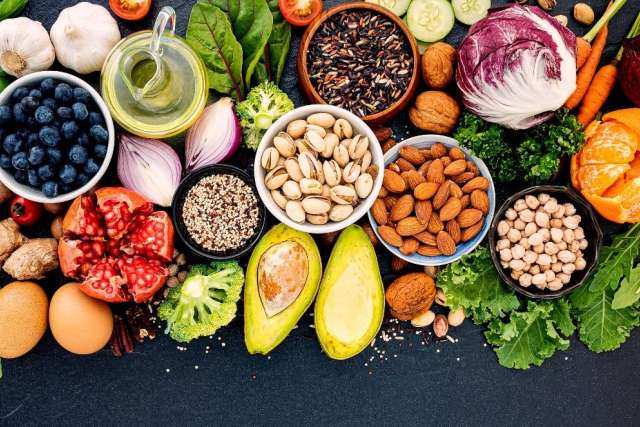Introduction to a healthy diet
Healthy eating is not just a trend. It’s an important lifestyle choice that can improve your health. We often choose convenience over nutrition in today’s fast paced world. What if you could fuel yourself with foods that taste good and also boost your vitality? A healthy diet is the basis for good health. It can affect everything from mood to energy levels and even lifespan. We’ll explore the importance of making better food choices in your daily life and how this can lead to a healthier, happier you.
Impact of unhealthy eating habits and overall health
Unhealthy eating can cause silent havoc to our bodies. Consuming processed foods with high sugars and unhealthy fats can lead to many health problems. The first sign of obesity is usually its weight. It’s not just about appearance, it can lead to more serious conditions.
Poor dietary habits are directly linked to heart disease, diabetes and hypertension. Excess calories without essential nutrients put the body under strain.
These eating habits also affect energy levels and mood stability. Nutritional deficiencies can lead to fatigue and irritability.
An imbalance in the types of foods consumed may also cause digestive problems. When fiber-rich foods like fruits and veggies are ignored, gut health can deteriorate.
What we eat has a significant impact on how we feel physically and mentally each day.
Fruits and vegetables are good for you.
They are packed with vitamins, minerals and antioxidants that support your body’s vital functions. Fruits and vegetables are rich in vitamins, minerals and antioxidants, which support the vital functions of your body.
Eating colorful fruits and vegetables can help boost your immunity. You can fight off illness more effectively.
These foods also contain a lot of fiber. Fiber helps with digestion and can keep you feeling satisfied for longer. This can help you maintain a healthy body weight.
Fruits and vegetables can enhance the flavor of your meals. Fresh ingredients give dishes a vibrant taste that turns them into culinary delights.
Research has also shown that people who consume a lot of fruits and veggies tend to be at lower risk of chronic diseases like diabetes and heart disease. It’s not only beneficial, but essential to your long-term wellbeing that you make these foods a part of your daily diet.
Whole grains, lean protein, and healthy fats are important in a balanced diet
Whole grains contain essential nutrients and fiber. They give you energy and keep you feeling fuller longer. You can improve digestion by including foods such as quinoa, whole wheat bread, and brown rice in your meals.
Lean protein is essential for muscle growth and repair. Chicken, turkey, fish and legumes help you maintain a healthy body weight, but they also curb your cravings. These proteins are essential for an active lifestyle.
You shouldn’t ignore healthy fats either. Avocados, nuts and seeds, olive oil, and other sources contribute to hormone production and brain function. Moderate consumption of these fats can help improve your overall health.
Balance between these elements promotes optimal health. A diet high in whole grains, healthy fats, and lean proteins will support energy levels, while also nourishing your body.
Healthy eating can help prevent chronic diseases
Healthy eating is an important ally against chronic disease. Your body functions better when it receives the essential nutrients it needs.
According to research, a diet rich in fruits, vegetables and whole grains reduces the risk of diabetes, heart disease and certain types of cancer. These foods are rich in antioxidants and vitamins, which help to reduce inflammation and boost the immune system.
Lean protein helps regulate blood sugar levels and maintain muscle mass. Healthy fats such as avocados and nuts promote heart health because they lower bad cholesterol.
Consistent diet choices affect not only physical health but also long-term outcomes. Prioritizing healthy options can help individuals create a healthier future free of debilitating diseases.
Eating nutritious foods can improve mental health
Your mental health will improve dramatically if you eat nutritious food. You nourish your body and mind when you feed it vitamins and minerals. Fruits and vegetables contain antioxidants which fight oxidative stress, inflammation and oxidative damage.
Fish like salmon, which contains omega-3 fatty acids, can improve your mood. They help support brain function, and reduce anxiety and depression symptoms. Whole grains help to stabilize blood sugar, which helps maintain emotional balance.
Gut-brain connections are real! Healthy eating promotes a flourishing microbial community, which influences neurotransmitter levels like serotonin. This “feel good” hormone is crucial in controlling mood.
Cooking at home also promotes mindfulness. Food preparation can be therapeutic. It allows you to appreciate and connect with each bite. Eating healthy isn’t only about your physical health. It’s also an investment in your emotional well-being!
Tips to maintain a balanced and healthy diet
It can be difficult to maintain a healthy eating plan, but with small adjustments it is possible. Plan your weekly meals. You will be more organized and less likely to make impulsive decisions.
Include variety in your diet. To keep your meals interesting and to ensure that you are getting different nutrients, try new grains, fruits, or vegetables.
Mindful eating is a good way to eat. Listen to your body and savor every bite. It helps you avoid overeating.
Always keep healthy snacks on hand. When cravings hit, try nuts, yogurt or sliced vegetables.
Do not forget to hydrate! Water can help you stay energized and reduce unnecessary snacking.
Include your family and friends in your quest for healthier eating habits. Cooking with friends and family can be motivational and fun!
Summary: Small changes can have a big impact on your overall health.
Healthy eating is essential to a happy life. Making small changes to your eating habits can have a significant impact on both your physical and mental well-being. Include more fruits and veggies in your diet. They are rich in vitamins, minerals and antioxidants, which support overall health.
Whole grains provide more energy than refined products, while lean protein helps build muscle and keeps you fuller for longer. Healthy fats like those found in avocados and nuts can help to maintain heart health.
These dietary choices have an impact that goes beyond weight loss. A balanced diet reduces the risk of chronic illnesses such as diabetes and cardiovascular disease. A balanced diet can also improve mental health, by improving mood and focusing.
Set realistic goals to maintain your lifestyle change. When hunger strikes, having nutritious snacks or meals prepared can help you to choose healthy options. Keep in mind that progress is more important than perfection.
When it comes to eating healthier, every little bit counts. Over time, small changes can lead to greater improvements in health. Healthy habits will help you live a happier, healthier life tomorrow.




